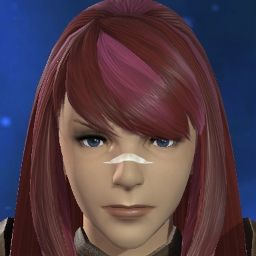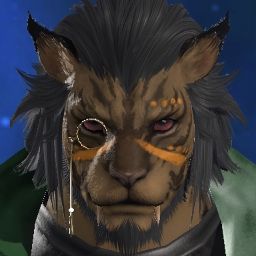-
12-19-2021 10:25 PM #261(0)あっきれた。
-
12-19-2021 11:01 PM #262
About those two
Emet already died in Shadowbringers so his soul should have already split if that was the case..which means that he should not have been able to use creation magic at the end of Endwalker. So yeah I too believe that we know have a bunch of souls in the lifestreams that are able to use creation magic.(1)
-
12-19-2021 11:25 PM #263Player

- Join Date
- May 2014
- Posts
- 2,881
- Character
- Kris Goldenshield
- World
- Tonberry
- Main Class
- Gladiator Lv 100
I believe the implications were that once dead and back in the lifestream, souls do not immediately dissolve. Especially on the way to Hydaelyn, we encountered several souls that have been dead for a good while now (obviously not sure how much in universe time has passed, but certainly souls have been lingering there that we encountered in 2.0 at the very least).
Regarding those two, we don't know is probably the best answer here. We're not sure they actually split into 7 parts, and if so, there's just no information on if we reformed the 7 parts, pulled pieces or even created a "primal" version of them. We just don't know.(6)
-
12-20-2021 05:27 AM #264Player

- Join Date
- Feb 2020
- Location
- Gridania
- Posts
- 129
- Character
- Eboshi V'teor
- World
- Goblin
- Main Class
- Dragoon Lv 100
Eventually though as Montichaigne said souls “are reduced to pure aether, coalesce with that of others, and create souls anew”, in addition to staying whole and returning to the corporeal world through reincarnation (the prime example being that of the WoL).
I really liked how Montichaigne argued that both processes are at work in the Aetherial Sea/Lifestream, as it allows for both traditional reincarnation to occur but also allows for entirely new original souls to be born as well.
As for whether the Souls inside Zodiark had been sundered along with him or not, the devs may or may not choose to further follow up on that, but I don’t think it’s super important if they do or don’t. Also I presume killing the sundered Zodiark on the Source also ends up destroying the literal missing other pieces of Zodiark in the other shards I guess? Or do those other pieces still exist in their respective shards?
Anyways even if there are unsundered souls now existing in the Aetherial Sea/Lifestream, I wouldn’t expect to see new individuals born with the power of creation magicks, at least from a Doylistic narrative perspective expectation.
(4)Last edited by Theozilla; 12-20-2021 at 09:42 AM.
-
12-20-2021 07:03 AM #265Player

- Join Date
- Feb 2020
- Posts
- 32
- Character
- Shirley Mairze
- World
- Midgardsormr
- Main Class
- Scholar Lv 90
Endwalker was truly a phenomenal, hauntingly beautiful story, but I’m really having trouble stomaching how poorly Zenos was handled.
His development was shafted in just about every way, and I’m puzzled why the writers gave him so many loose threads after Stormblood that ultimately lead to nothing - his dreaming of Amaurot, Elidibus calling him an invaluable test subject, and Fandaniel wondering “Could Emet-Selch have found a way…?” in regards to his dreams…none of this addressed. There was incredible potential for him to be one of the most compelling characters in this story, but he served as more of a footnote than anything else.
What’s most frustrating is that we’re never, ever allowed to show Zenos a modicum of sympathy (which is especially gut-wrenching if you’ve read this canon short story, which really should have been shown/mentioned in-game before his death.) He was instrumental in our fight against The Endsinger, and we can’t even thank him. We just…abandon his body to the edge of the universe. What does that mean for his soul? Did it endure once more due to his Resonant abilities, or was he somehow perma-killed? And if it’s the latter, does he get to return home to Etheirys’ aetherial sea for an opportunity to try again, or is he just drifting out there in the dark expanse? He got exactly what he wanted in the end, but the fate of his soul may be even unkinder than that of Amon’s, who wrought significantly more damage.
Old villains who have done equal harm (or more!) are treated with much more grace by the narrative, particularly if they help the WoL at some point. Even before knowing Fandaniel as Hermes, the game implores us to try to understand him via that exchange with Estinien pre-EW. Why is Zenos not afforded the same courtesy? If we weren’t going to approach him in such a way, particularly with all of his loose threads, he should have stayed dead after Stormblood.
I shared these thoughts on my twitter, and got a few replies that were essentially, "there's no way we're done with Zenos, yet - he's coming back for sure." and while that wouldn't make any sense whatsoever with the finality expressed during that fight, I can't help but hope the same thing because of how badly he was bungled in a story that otherwise flawless. ...I want to teach him there's more to live for. :((0)Last edited by Vuro; 12-20-2021 at 07:18 AM.
-
12-20-2021 07:25 AM #266Player

- Join Date
- Sep 2013
- Location
- Uldah
- Posts
- 480
- Character
- Varsir Ishtear
- World
- Gilgamesh
- Main Class
- Pugilist Lv 100
(2)The rains have ceased, and we have been graced with another beautiful day. But you are not here to see it..
-
12-20-2021 07:47 AM #267Player

- Join Date
- Feb 2020
- Location
- Gridania
- Posts
- 129
- Character
- Eboshi V'teor
- World
- Goblin
- Main Class
- Dragoon Lv 100
If the sundering does indeed automatically apply to Unsundered Souls after death, that wouldn’t make the Rejoinings pointless, as the rejoined shards still would no longer exist to be sundered into. So in this hypothetical scenario, if an Unsundered soul died during the 3rd Astral Age, it would split into 11 pieces while if happened in the 7th Astral Age it only splits into 7 seven pieces (with the Source piece presumably being denser than the others).
Of course the number of Unsundered Souls that even exist, that we know definitely existed post-Sundering were Lahabrea, Elidibus, and Emet-Selch. Whether Venat and the souls inside Zodiark were sundered or not is still somewhat ambiguously defined. So it’s not like that hypothetical scenario could ever really be tested.
Though if I were to state my current interpretation based on my present understanding, I think Venat and the Souls inside Zodiark count as Unsundered.
As for Zenos, while don’t think he will come back to life again. I don’t necessarily think that means the unanswered plot threads (e.g. his reoccurring dream of Amaurot and the Final Days, Fandaniel’s “Could Emet-Selch have found a way…?” comment, etc.) surrounding him will go unanswered/unexplored. Stuff about a character can still be further explored even after death.
(1)Last edited by Theozilla; 12-20-2021 at 09:34 AM.
-
12-20-2021 08:00 AM
Player
-
12-20-2021 11:14 AM #268Player

- Join Date
- Nov 2017
- Posts
- 14,157
- Character
- Aurelie Moonsong
- World
- Bismarck
- Main Class
- Red Mage Lv 100
An explanation I've seen elsewhere that makes sense:
The inhabitants are initially recreated memories, as explained to us while we're exploring, but that changes when we summon Emet and Hyth and they work their magic to allow us to reclaim the other Scions' souls. This (according to the theory) flooded the whole zone with aether, replacing the dynamis that originally gave it form – so the Scions' aether is no longer needed to do the same job – and this seems to have affected the inhabitants as well. It has given them physical aether-based forms and they seem to have broken out of the frozen state they were trapped in.
What do you mean, I seem to have a pet subject...?
G'raha's timeline has always been an oddity because it contrasted with the Alexander plot before it, which indicates that time loops are the standard outcome of time travel shenanigans and G'raha's successful "breaking out" is inconsistent.
My own theory is that the split specifically happened because he altered the past in a way that could not be reconciled with his original future, so the timeline has to take a second course but the first one can't be shut down.
For everything else, the changes get absorbed into the single original timeline.
The "Elpis time loop" doesn't have anything to do with G'raha's timeloopspiral besides that his actions paved the way for the timeline where the Elpis loop is completed.
You don't need one to happen "before" the other can be fulfilled. In the sort of objective whole-of-timeline view of everything that happened over time, they're just separate loops and swirls that link into each other.
We may feel like we "create" time as we live it, but as soon as it's possible to make contact with someone from another point in time, you have to accept that from another person's perspective your future has already happened even though you are in full control of your actions at all times.
Emet and Hyth were successfully summoned out of Etheirys's Lifestream and talk as if they'll go back there once they dissipate, so presumably (if dead) Zenos would as well.
There's a line somewhere about souls returning to the Lifestream "or joining a larger flow"? Perhaps Etheirys is actually some kind of aetherial centre point for the entire universe and "Silvertear Lake as the source of all aether/magic" (I cant remember which) is not just for the planet itself.
Is he a Frankenstein's monster or a robot? Either way, any fully artificial creation of a human form by a Garlean (be it a statue or a child's drawing or a high-tech robotic abomination) is likely to have the third eye because that's what people are to them, in the same way that the statues on the Azim Steppe are horned Au Ra.
From general context it's likely that, if organic, Barnabas is a hypertuned – but the mere presence of a third eye isn't specific proof of that.(4)Last edited by Iscah; 12-20-2021 at 11:40 AM.
-
12-20-2021 11:21 AM #269Player

- Join Date
- Nov 2017
- Posts
- 14,157
- Character
- Aurelie Moonsong
- World
- Bismarck
- Main Class
- Red Mage Lv 100
You know what would have been an excellent resolution to a side story problem if it could have been made canon?
Using Alexander to power the Ragnarok. Wake him up, get him to drop Mide and Dayan off in the past to complete their time loop, use up all of his aether before we resort to scavenging the Mothercrystal.
It would also provide an excellent excuse for any strange space-time anomalies like the lampshaded presence of the Ragnarok in both Labyrinthos and Ultima simultaneously.
Of course, there might still be future plans for something to happen with Alexander before Mide and Dayan escape from their eternal moment. Or the writers don't want to lose the option for it anyway.
And actually...
If we can siphon off the energy of the Mothercrystal by draining it into smaller primals, can't we unmake Alexander's core in the same way? Draw them out and destroy or repurpose them, Eden-style.(0)Last edited by Iscah; 12-20-2021 at 01:23 PM.
-
12-20-2021 01:02 PM #270Player

- Join Date
- Sep 2013
- Location
- The Hermit's Hovel
- Posts
- 3,709
- Character
- Trpimir Ratyasch
- World
- Lamia
- Main Class
- Gunbreaker Lv 100
Further thoughts
Anima being reduced to a dungeon boss was disappointing... but they kept her, or him in this instance, true to the spirit of the original while also twisting it around to fit Zenos' villainous intentions.
Zodiark is pretty damn ugly for the Ancients' "god / will of the star," but I love how they're faithfully recreating Amano's artwork for such big characters as him and Hydaelyn in 3D models.
The one part where the story dragged was Labyrinthos - the proper, second visit. "World's ending, better send a bunch of people on expeditions and manually ship stuff, over sea, while we philosophize with rabbit folk from the moon." It didn't bother me too much though, because the loporrits are both adorable and wise.(5)Trpimir Ratyasch's Way Status (7.4 - End)
[ ]LOST [X]NOT LOST
"There is no hope in stubbornly clinging to the past. It is our duty to face the future and march onward, not retreat inward." -Sovetsky Soyuz, Azur Lane: Snowrealm Peregrination






 Reply With Quote
Reply With Quote









